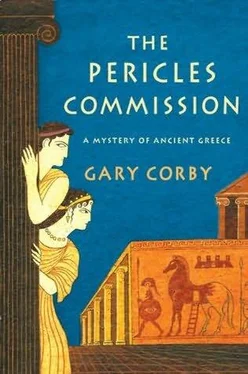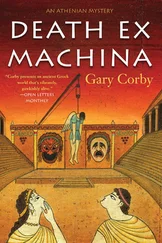Gary Corby - The Pericles Commission
Здесь есть возможность читать онлайн «Gary Corby - The Pericles Commission» весь текст электронной книги совершенно бесплатно (целиком полную версию без сокращений). В некоторых случаях можно слушать аудио, скачать через торрент в формате fb2 и присутствует краткое содержание. Жанр: Исторический детектив, на английском языке. Описание произведения, (предисловие) а так же отзывы посетителей доступны на портале библиотеки ЛибКат.
- Название:The Pericles Commission
- Автор:
- Жанр:
- Год:неизвестен
- ISBN:нет данных
- Рейтинг книги:5 / 5. Голосов: 1
-
Избранное:Добавить в избранное
- Отзывы:
-
Ваша оценка:
- 100
- 1
- 2
- 3
- 4
- 5
The Pericles Commission: краткое содержание, описание и аннотация
Предлагаем к чтению аннотацию, описание, краткое содержание или предисловие (зависит от того, что написал сам автор книги «The Pericles Commission»). Если вы не нашли необходимую информацию о книге — напишите в комментариях, мы постараемся отыскать её.
The Pericles Commission — читать онлайн бесплатно полную книгу (весь текст) целиком
Ниже представлен текст книги, разбитый по страницам. Система сохранения места последней прочитанной страницы, позволяет с удобством читать онлайн бесплатно книгу «The Pericles Commission», без необходимости каждый раз заново искать на чём Вы остановились. Поставьте закладку, и сможете в любой момент перейти на страницу, на которой закончили чтение.
Интервал:
Закладка:
“Where could I find out more about Themistocles?”
“Try his temple.”
“His temple?”
Lysimachus laughed. “Oh, he built it in honor of Artemis of Wise Counsel, but no one doubted who he really meant to honor. It was such arrogance as this that disturbed the common people so much they were willing to ostracize him. If it hadn’t been for his personal faults he might still be ruling Athens today, and Ephialtes would never have led the democrats, nor reformed the Areopagus.”
“Nor been murdered,” I couldn’t help adding.
Lysimachus nodded. “Yes, young Nicolaos, I think you probably have the right of that. Tell me, what are they saying in the Agora?”
“That the old men of the Areopagus killed him.”
“Revenge? Well, it wouldn’t be the first time an Athenian killed for that reason, but somehow, in this case, I doubt it. Revenge is stupid, and these men aren’t stupid, whatever else people might think of them. Why risk their position for mere satisfaction? No, if the Areopagus killed him, it must have been for a good reason.”
“What reason?”
He shrugged. “I know of none. That’s why I don’t think they’re involved.”
“Then tell me, Lysimachus, what do you think happened to Ephialtes?”
“I wish I knew! But whatever it is, it will be something to do with power. Power’s what drives this city, young Nicolaos. And I tell you, Sophroniscus my friend, if this goes on we could lose everything.” Lysimachus rubbed his chin and frowned. “Political destruction is one thing-even my own father was ostracized and took it in good part-but to murder a man for his politics is the next best thing to armed insurrection.”
That intrigued me. “Your own father was ostracized, Lysimachus?”
“He was indeed, and the cause was a bitter political infight with the man we were just discussing: Themistocles. This was before the Persians came, lad; you were not even born yet. My father, Aristeides, whom men called the Just for his fairness and honesty, argued against Themistocles on the matter of whether to meet the coming enemy with a large army or a large navy. The argument became so heated that an ostracism was called, and Aristeides lost.” He smiled. “My father even had to cast a vote against himself. He offered to help a man who didn’t know how to write. The man said he wanted to vote for Aristeides-he was a farmer from out of town, you see, and didn’t know to whom he was speaking. My father, intrigued, asked what the man had against Aristeides if he had never met him, and the farmer replied he was sick of all this constant talk of ‘Aristeides this’ and ‘Aristeides that,’ and ‘Aristeides and all his fine virtues.’ So my unfortunate father meekly wrote his own name on the shard and dropped it into the voting box!” Lysimachus laughed. “Themistocles had the right of it, I admit it; the navy he created was what saved us.
“But that’s the past, and it’s the future that worries me. There’s a party in this city willing to kill for power, and that is very, very dangerous. The next logical step is armed coup.”
Sophroniscus looked alarmed. “Do you think something like that is brewing?”
Lysimachus shrugged. “Who can say?”
Sophroniscus muttered to himself, “I will move the family treasury outside the city tomorrow.”
“When was the last time something like this happened?” I asked, curious.
Lysimachus thought about it while he held out his cup to be refilled.
“The last political killing? You’d have to go back to when the last tyrant was expelled. That’s what…three, four generations ago?”
I was exhausted by the day and disappointed by the evening. I could not keep my eyes open a moment longer and so asked Father for permission to retire. He gave it, and I departed while Lysimachus continued his discourse on the dangers to Athens. I noticed Sophroniscus glance at me curiously.
The next morning at breakfast, our kitchen slave brought two small bowls of bread soaked in wine. She smiled at me as if to silently say that she sympathized. She would have heard every word that had been said last night. Certainly every slave in the house knew I had disagreed with my father.
Sophroniscus let me finish the meal and then led me into the workshop at the back of our house. Inside was a marble statue of a horse that had won at the last Panathenaic Games, commissioned by its owner as an offering in thanks to the Gods for his victory.
The statue was almost finished. I sighed, picked up the necessary cloth, and began rubbing its rear end. This was the story of my life; great events were happening all about me, I could feel the world was changing, and here I was rubbing the rear end of a stone horse. Sophroniscus began chipping away at another block with mallet and chisel, his preliminaries for another work. He usually left me to finish a piece while he commenced his next job. I continued the tedious rubbing, silent.
Sophroniscus observed my deep unhappiness and said, “Cheer up, son. There’s no reason you shouldn’t discuss politics in the Agora with the other young men. It’s a fine thing for any man to think about the future of the state. It’s simply not possible for anyone but the rich to do it full time, and especially not for a man who’s destined to be a sculptor.”
“But Father, I don’t want to be a sculptor.”
“You don’t-” Sophroniscus put down his tools in amazement and repeated, “You don’t want to be a sculptor?”
“No.”
“But I always thought…that is, you always said you did.”
“No, Father, you always talk about how I will.”
“Why didn’t you tell me before?”
“I did, I tried rather, several times. But Father, you always talked over me.”
I had never before seen Sophroniscus shocked. He paced across the workshop, stopped to touch the piece I had been smoothing and ran his finger along it, picking up the dust. “This is a terrible disappointment. You do good work.”
“I’m sorry, Father.” And it was not a lie; I don’t believe I have ever felt such sadness as that moment. But we had been building toward this confrontation for years and I was not going to step back from it now that the moment had come.
“What would you do then? You cannot earn money as a politician, Nicolaos. That’s where you spend it. Who ever heard of paying a man to wield power? The idea’s ridiculous.”
“But Father, what if I can make money doing politics?”
“Then I would say you are practicing magic, or you are corrupt. I hope you are neither. We talked last night of how such men are usually caught in the end.”
“This commission from Pericles-if I succeed I will earn a substantial reward.”
Sophroniscus scoffed. “Enough to live on? I doubt it.”
“Enough to start with. I hope so.”
“And what of the next commission? And the one after that? I tell you important politicians aren’t murdered every day, my boy. It’s not exactly a thriving industry, no, nor even a small trade.”
“I see myself acting as an agent to men such as Pericles. It is a trade, Father, a kind of political trade.”
“Morally dubious and physically dangerous. Very dangerous.”
“More dangerous than serving in the army?”
Sophroniscus considered. “Perhaps not.”
“Yet, Father, you served in the army when the Persians came.”
“And will again if they return. That is the simple duty of every citizen to protect his city.”
“Isn’t what I propose the same thing then, sir?”
“We are discussing the difference between an honorable death facing the enemy in combat, and a knife in the back in the dead of night. I know which risk I’d prefer.”
“I’m willing to take that chance, Father.”
Читать дальшеИнтервал:
Закладка:
Похожие книги на «The Pericles Commission»
Представляем Вашему вниманию похожие книги на «The Pericles Commission» списком для выбора. Мы отобрали схожую по названию и смыслу литературу в надежде предоставить читателям больше вариантов отыскать новые, интересные, ещё непрочитанные произведения.
Обсуждение, отзывы о книге «The Pericles Commission» и просто собственные мнения читателей. Оставьте ваши комментарии, напишите, что Вы думаете о произведении, его смысле или главных героях. Укажите что конкретно понравилось, а что нет, и почему Вы так считаете.












